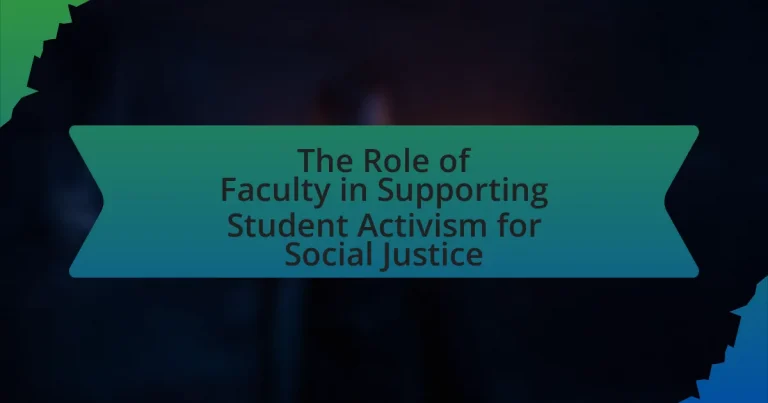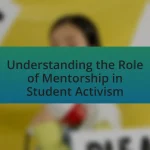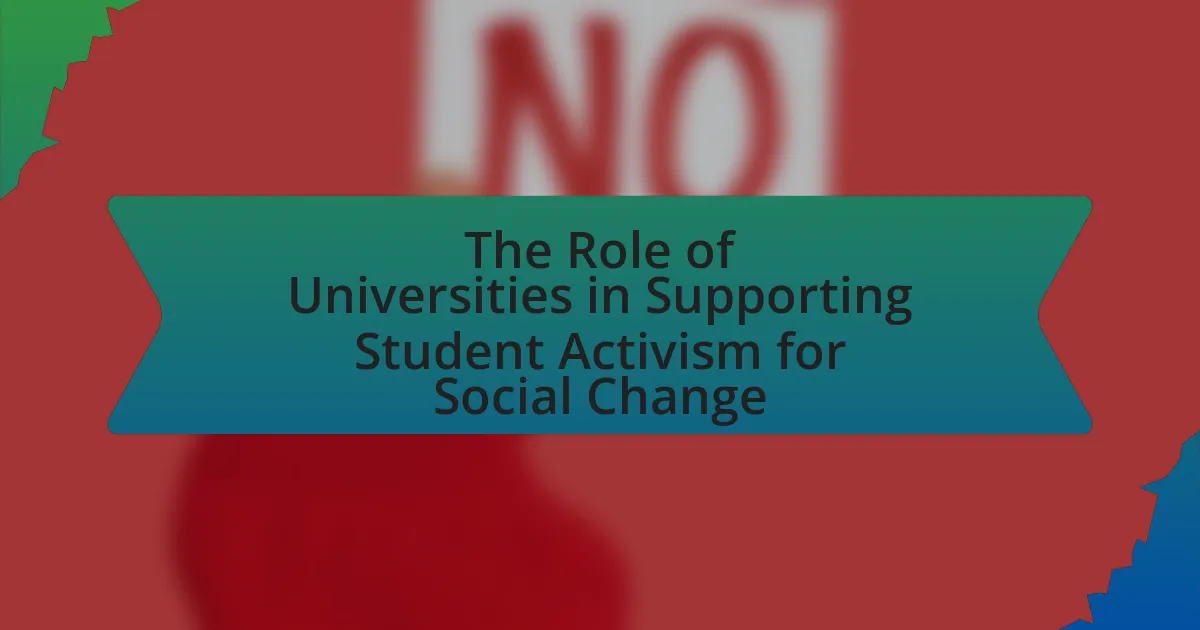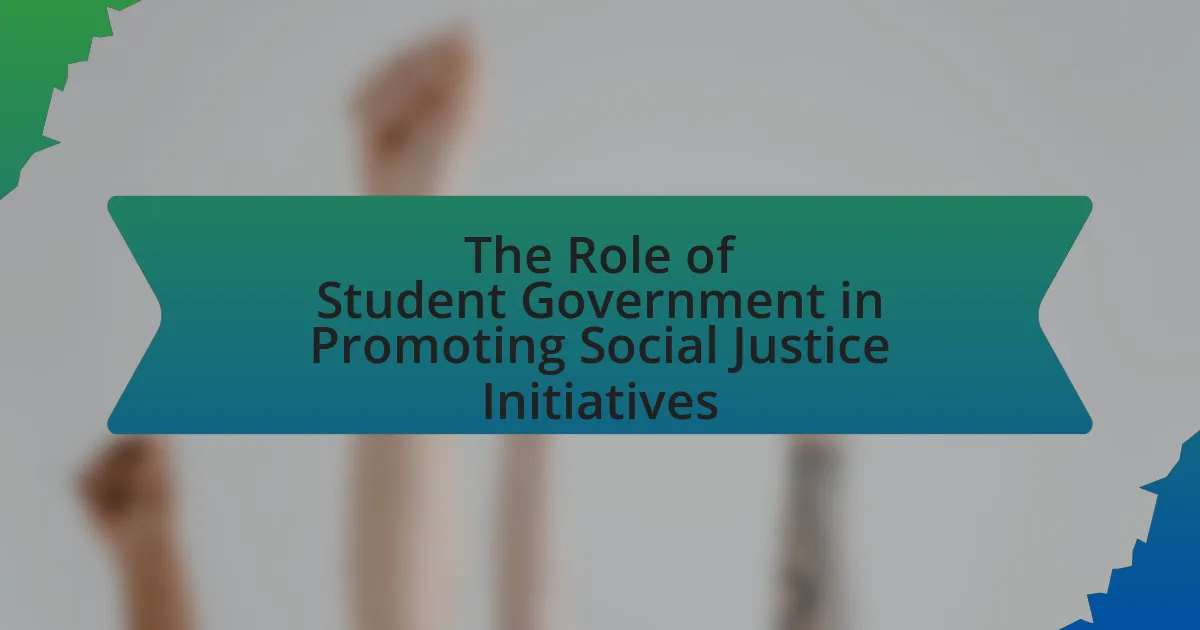The article examines the critical role of faculty in supporting student activism for social justice. It highlights how faculty members provide mentorship, resources, and platforms for dialogue, facilitating student engagement with social justice issues. The article discusses the influence of faculty on student activism, the specific actions they take to support student-led initiatives, and the importance of faculty endorsement in enhancing student participation. Additionally, it addresses the challenges faculty face, institutional barriers, and best practices for fostering a supportive environment for activism, ultimately emphasizing the significance of collaboration between faculty and students in promoting social justice initiatives.
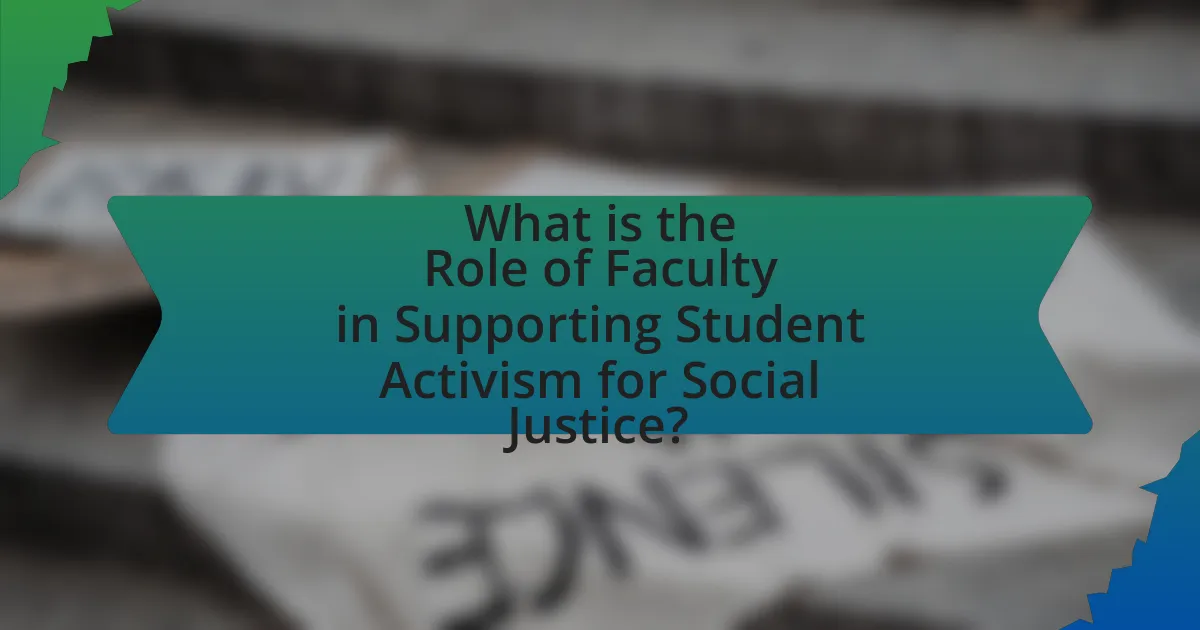
What is the Role of Faculty in Supporting Student Activism for Social Justice?
Faculty play a crucial role in supporting student activism for social justice by providing mentorship, resources, and a platform for dialogue. They facilitate critical discussions in the classroom, encouraging students to engage with social justice issues and develop their activism skills. Faculty members can also guide students in organizing events, connecting them with community resources, and advocating for institutional changes that promote equity. Research indicates that faculty involvement in social justice initiatives enhances student engagement and empowerment, fostering a more inclusive campus environment. For instance, a study published in the Journal of Higher Education found that faculty support significantly increases student participation in activism, leading to more impactful social change.
How do faculty members influence student activism for social justice?
Faculty members influence student activism for social justice by serving as mentors, facilitators, and role models. They provide critical guidance and support, helping students develop the skills necessary for effective activism. For instance, faculty can integrate social justice themes into their curricula, encouraging students to engage with real-world issues. Research shows that when faculty actively participate in social justice initiatives, such as community service or advocacy projects, students are more likely to become involved themselves. A study published in the Journal of Higher Education found that faculty involvement in social justice education significantly correlates with increased student activism, demonstrating the powerful impact faculty can have on fostering a culture of engagement and advocacy among students.
What specific actions do faculty take to support student-led initiatives?
Faculty support student-led initiatives by providing mentorship, facilitating resources, and advocating for student voices within institutional frameworks. Faculty members often engage in one-on-one mentoring sessions to guide students in developing their initiatives, ensuring they have the necessary skills and knowledge. Additionally, faculty facilitate access to resources such as funding, meeting spaces, and materials, which are crucial for the success of student projects. Furthermore, faculty advocate for student-led initiatives by representing student interests in administrative discussions, thereby amplifying their voices and ensuring that their concerns are addressed within the institution. This multifaceted support system is essential for fostering an environment where student activism can thrive.
How do faculty members serve as mentors for student activists?
Faculty members serve as mentors for student activists by providing guidance, resources, and support to help them navigate their activism effectively. They offer expertise in areas such as social justice, policy analysis, and community organizing, which equips students with the necessary skills to advocate for change. Additionally, faculty members often facilitate connections with relevant organizations and networks, enhancing students’ outreach and impact. Research indicates that mentorship from faculty can significantly increase students’ confidence and commitment to activism, as seen in studies highlighting the positive correlation between faculty support and student engagement in social movements.
Why is faculty support crucial for student activism?
Faculty support is crucial for student activism because it provides essential resources, mentorship, and legitimacy to student-led initiatives. Faculty members can leverage their expertise and institutional authority to amplify student voices, helping to navigate administrative challenges and fostering a collaborative environment. Research indicates that when faculty actively engage with student activism, it enhances the effectiveness of campaigns, as seen in the 2015 University of Missouri protests, where faculty solidarity significantly influenced the administration’s response to student demands. This collaboration not only empowers students but also enriches the academic community’s commitment to social justice.
What impact does faculty endorsement have on student engagement?
Faculty endorsement significantly enhances student engagement by validating student voices and initiatives. When faculty publicly support student activism, it fosters a sense of legitimacy and encourages participation among students. Research indicates that students are more likely to engage in social justice activities when they perceive faculty as allies; for instance, a study published in the Journal of Higher Education found that 75% of students reported increased motivation to participate in activism when faculty expressed support. This endorsement not only boosts student confidence but also creates a collaborative environment that promotes active involvement in social justice issues.
How does faculty involvement enhance the legitimacy of student movements?
Faculty involvement enhances the legitimacy of student movements by providing academic credibility and institutional support. When faculty members actively participate in student activism, they lend their expertise and authority, which can validate the concerns raised by students. For instance, research conducted by the American Association of University Professors indicates that faculty engagement in social justice initiatives can lead to increased visibility and acceptance of student movements within the broader academic community. This collaboration fosters a sense of solidarity and amplifies the students’ voices, making their demands more compelling to administration and policymakers.
What challenges do faculty face in supporting student activism?
Faculty face several challenges in supporting student activism, including institutional constraints, potential backlash from administration, and balancing academic responsibilities with activism. Institutional constraints often limit faculty’s ability to engage fully, as policies may discourage political involvement or activism on campus. Additionally, faculty may encounter backlash from administration or colleagues who oppose the activism, creating a hostile environment that can deter support. Balancing academic responsibilities, such as teaching and research, with the demands of supporting student activism can also strain faculty time and resources, making it difficult to provide adequate support. These challenges highlight the complexities faculty navigate while trying to foster a supportive environment for student activism.
What institutional barriers hinder faculty support for social justice initiatives?
Institutional barriers that hinder faculty support for social justice initiatives include lack of administrative backing, insufficient funding, and rigid curriculum structures. These barriers create an environment where faculty may feel unsupported or unable to engage in social justice efforts. For instance, without administrative endorsement, faculty may hesitate to advocate for changes that align with social justice principles, fearing repercussions or lack of resources. Additionally, limited funding restricts the ability to implement programs or initiatives that promote social justice, while rigid curriculum structures can prevent the integration of social justice topics into coursework, thereby stifling faculty engagement in these critical discussions.
How can faculty navigate potential conflicts with administration?
Faculty can navigate potential conflicts with administration by establishing clear communication channels and fostering collaborative relationships. Open dialogue allows faculty to express concerns and seek mutual understanding, which is essential in addressing issues related to student activism for social justice. Research indicates that institutions with strong faculty-administration communication frameworks experience fewer conflicts and enhanced cooperation (Bess & Dee, 2012). By actively participating in shared governance and advocating for student needs, faculty can align their objectives with administrative goals, thereby reducing friction and promoting a supportive environment for social justice initiatives.
How can faculty effectively engage with student activists?
Faculty can effectively engage with student activists by fostering open communication and creating collaborative spaces for dialogue. This approach allows faculty to understand the concerns and motivations of student activists, facilitating a supportive environment. Research indicates that when faculty actively listen and participate in discussions, it enhances student engagement and empowerment, leading to more impactful activism. For instance, a study published in the Journal of Higher Education found that faculty involvement in student-led initiatives significantly increased the likelihood of successful outcomes in social justice campaigns.
What strategies can faculty employ to foster a supportive environment?
Faculty can foster a supportive environment by implementing inclusive teaching practices, actively engaging with students, and promoting open dialogue. Inclusive teaching practices, such as diverse curriculum content and varied assessment methods, ensure that all students feel represented and valued. Active engagement, through regular check-ins and mentorship opportunities, helps build trust and rapport between faculty and students. Promoting open dialogue allows students to express their thoughts and concerns freely, creating a safe space for discussion on social justice issues. Research indicates that supportive faculty-student relationships enhance student engagement and academic success, reinforcing the importance of these strategies in fostering a positive educational environment.
How can faculty create inclusive spaces for dialogue on social justice?
Faculty can create inclusive spaces for dialogue on social justice by implementing structured discussions that encourage diverse perspectives. This can be achieved through establishing ground rules that promote respect and active listening, ensuring all voices are heard. Research indicates that inclusive pedagogies, such as collaborative learning and critical reflection, enhance student engagement and understanding of social justice issues. For instance, a study by the American Association of Colleges and Universities found that inclusive teaching practices lead to improved student outcomes and a greater sense of belonging among marginalized groups. By fostering an environment where students feel safe to express their views, faculty can effectively support meaningful dialogue on social justice.
What role does collaboration with student organizations play in activism?
Collaboration with student organizations plays a crucial role in activism by amplifying voices, fostering community engagement, and enhancing the effectiveness of social justice initiatives. When students unite through organizations, they can pool resources, share knowledge, and mobilize larger groups for collective action, which significantly increases their impact. For instance, research from the American Council on Education indicates that student-led initiatives often lead to higher participation rates in activism, demonstrating that organized efforts can effectively address social issues. Additionally, collaboration allows for diverse perspectives, enriching the dialogue around social justice and ensuring that various community needs are represented.
What best practices can faculty adopt to support student activism for social justice?
Faculty can adopt several best practices to support student activism for social justice, including creating inclusive curricula, facilitating open dialogues, and providing mentorship. Inclusive curricula that reflect diverse perspectives empower students to engage with social justice issues critically. Facilitating open dialogues in classrooms encourages students to express their views and learn from one another, fostering a collaborative environment. Additionally, providing mentorship helps students navigate their activism effectively, as faculty can guide them in organizing events, connecting with community resources, and understanding the broader implications of their actions. These practices are supported by research indicating that faculty involvement enhances student engagement and activism, leading to more impactful social justice initiatives.
How can faculty integrate social justice themes into their curriculum?
Faculty can integrate social justice themes into their curriculum by incorporating diverse perspectives, critical discussions, and real-world applications related to social justice issues. This can be achieved through the selection of course materials that reflect a variety of voices and experiences, such as texts by authors from marginalized communities. Additionally, faculty can design assignments that encourage students to engage with social justice topics, such as community-based projects or research that addresses local inequalities. Evidence shows that curricula that include social justice themes not only enhance students’ critical thinking skills but also foster a sense of civic responsibility, as demonstrated in studies like “Teaching for Social Justice: A Critical Pedagogy Approach” by authors like Antonia Darder and Richard D. Kahn, which highlight the positive impact of such educational practices on student engagement and activism.
What resources are available for faculty to enhance their support for student activism?
Faculty can access various resources to enhance their support for student activism, including professional development workshops, online toolkits, and collaboration with student organizations. Professional development workshops often focus on social justice education and activism strategies, providing faculty with practical skills and knowledge to support student initiatives. Online toolkits, such as those offered by organizations like the American Association of University Professors, provide guidelines and resources for faculty to engage effectively with student activism. Additionally, collaboration with student organizations fosters a supportive environment, allowing faculty to understand student needs and perspectives better. These resources collectively empower faculty to play a more active role in supporting student-led social justice efforts.
